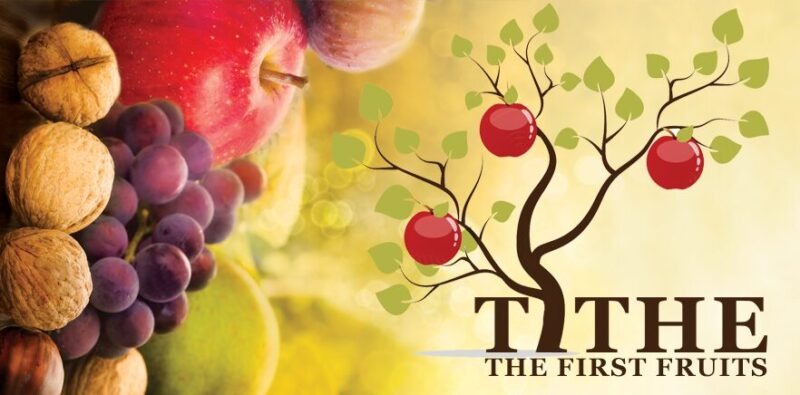In the contemporary Christian community, the debate over tithing has become a defining issue, one that many believers grapple with as they navigate their faith in a rapidly changing world.
A new book, "The Unholy Tithe" by Apostle Johanes Vegba, the La Area Superintendent of the Apostolic Church, delves deeply into this contentious subject, raising probing questions and offering insights that aim to guide Christians on their journey of understanding tithes.

Apostle Vegba’s foreword sets the stage for an exploration of one of the most debated aspects of Christian practice today - whether tithing remains relevant in modern-day faith.
The book opens by highlighting the dilemma: Should Christians, in today’s context, continue to pay tithes as a demonstration of their devotion? Or has this ancient practice become an unnecessary burden, akin to what some see as outdated religious customs? In the foreword, Apostle Vegba contends that the rise of secularism and individualism has prompted many believers to re-evaluate practices like tithing. The Bible, he notes, foretold an era where knowledge would increase, and people would become more self-centred, prioritizing personal enjoyment over religious duties.

The central question posed by the book is whether a Christian who refrains from tithing is merely a “lover of himself” rather than a lover of God. He contrasts this perspective with the view that modern-day ministers exploit tithing for personal gain, raising the possibility that some preachers may also be more focused on self-interest than on their congregation’s spiritual well-being.
In an unusual analogy, the foreword compares the roles of an apothecary and a perfumery, drawing a parallel between their functions and the relationship between religious institutions and their followers. Just as one cannot be healed without using a prescription from an apothecary, Apostle Vegba suggests that the deeper spiritual benefits of religion might require a commitment like tithing - though whether this analogy fully applies to Christianity remains a point of debate in the text.
The book acknowledges that tithing has roots in Judaism, predating Christianity and even forming part of the religious practice of Jesus and his disciples. The foreword references a crucial biblical passage from Matthew 5:17, where Jesus asserts his mission to fulfil rather than abolish the law. For many believers, this raises a fundamental question: Does Jesus’s fulfilment of the law imply that Christians remain obligated to practices like tithing?

Yet, Apostle Vegba invites readers to reflect on the distinction between the teachings of the Old Testament and the spirit of the New Testament. He points to a famous saying of Jesus - about putting new wine into new wineskins - as a metaphor for the evolution of religious practices, suggesting that clinging to outdated rituals might harm the church’s mission.
The book ultimately aims to provide a comprehensive biblical analysis of tithing. It seeks to answer whether tithes are essential for a Christian's spiritual journey and whether non-payment could carry eternal consequences. At the heart of the book is the intention to equip believers with the scriptural knowledge they need to make informed decisions on tithing.

In his foreword, He emphasizes that his views, though firmly rooted in biblical doctrine, are not binding. Instead, they serve as a guide for those wrestling with the question of whether to tithe. However, he warns that dismissing these perspectives lightly could be perilous, emphasizing the gravity of the tithing decision.
As the La Area Superintendent of the Apostolic Church, Apostle Vegba offers a perspective grounded in years of spiritual leadership and biblical scholarship. His book positions itself as a crucial resource for believers at a time when Christianity faces challenges from within and without. As the debate over tithing rages on, he calls on Christians to choose their path with both caution and reverence for scripture. Through a detailed exploration of tithes, he offers a roadmap for those seeking clarity amidst the controversy, believing that this guidance could provide a much-needed beacon in turbulent times.
As tithing remains a topic that divides congregations and theologians alike, the book invites readers to delve into the heart of the issue, challenging them to examine their beliefs and come to a personal understanding of what it means to be faithful. It is a call to introspection, to weigh tradition against the evolving nature of faith, and to navigate the crossroads with conviction.
Latest Stories
-
Saminu Abdul Rasheed smashes national record again with 9.84s sprint in Georgia
2 hours -
Blekusu Coastal project: We’re reclaiming our coastlines – Housing Minister
5 hours -
Pricey plantains push Ghana’s market sellers to diversify
5 hours -
Full list: NPP delegates approve 54 reform motions, reject proposals on youth age, election supervision
5 hours -
WAFCON 2024: Cynthia made it easy – Chantelle hails goalkeeper after penalty saves
5 hours -
Cyber Security Authority boss suspended over use of military bodyguard
6 hours -
WAFCON 2024: I want to make history – Grace Asantewaa dreams of lifting the trophy
6 hours -
Afenyo-Markin accuses NDC of rebranding and claiming credit for NPP projects
6 hours -
2024 WAFCON: Grace Asantewa shines as Black Queens reach semis
6 hours -
WAFCON 2024: Ghana beat Algeria 4-2 on penalties to book semi-final spot for the first time since 2016
6 hours -
NPP Delegates reject motion to shift polling station selection oversight to regional committees
6 hours -
2024 WAFCON: Black Queens set up semifinal clash with hosts Morocco
6 hours -
Dr. Amuasi champions healthy sustainable socio-ecological systems thinking in Lancet One Health Commission Report
6 hours -
Without unity, we’re just individuals with ambition – Afenyo-Markin
6 hours -
Rebecca Tweneboah Darko: Scattered thoughts; Scary times
6 hours

